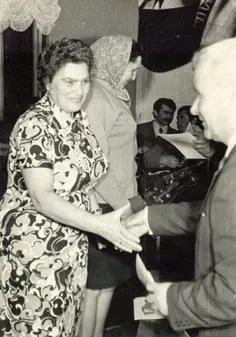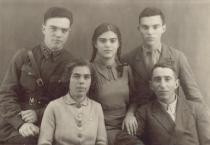It is me awarded a medal in commemoration of the 30th anniversary of the Victory in the Great Patriotic War at the medical equipment plant. This photo was taken in Odessa in 1975.
During the Great Patriotic War in Tashkent I worked at the radio plant which evacuated from Moscow. I turned 16 and had a passport. Our shop manufactured radios and special radios in soft cases for wounded so that they could listen to the radio in bed. I coiled transformers with a little engine. I worked 12 hours a day. There was a meter. I had to strain my eyes to see numbers on it in the dim electric lighting. Our shop was in a former department store storage facility. There was a window very high from the floor and we actually didn't get any daylight. There was a bulb over each workplace. We worked in shifts: one week from 8 am till 8 pm and another week a night shift: from 8 pm till 8 am. When I worked day shifts in winter I stayed overnight at the plant since it was dark already at 8 pm. The shift switch day was our only day off. I was a Stakhanovite and an active Komsomol member. My monthly salary was 600-700 and sometimes 800 rubles. This money was just enough to buy bread in stores sold per coupons. Our family was starving: we ate zatirukha [a kind of porridge] and made borsch from vine leaves. Therefore on the 30th anniversary of the Victory in the Great Patriotic War I got a medal, as a participant of War.
The 'Krushchev thaw' didn't reflect on our family. However, I faced anti-Semitism. I couldn't find a job due to my Item 5 in my passport. My acquaintance Polina Yakovlevna Zhadan, a Jew, helped me to get a job of a cashier in Odessa Machine Building College. I replaced her while she was on her maternity leave. I learned my duties fast and director and chief accountant were happy with my performance. I had a good handwriting and our accountant often asked me to write reports. When the cashier came back from her maternity leave they wanted to make me a lab assistant, but deputy director refused for some over made reason. It was clear that the reason was my Jewish identity. Then I heard about a vacancy of cashier in the College of Credits and Economics. Their human resources manager, a retired military, confirmed that they had a vacancy, but when he looked into my passport he lost interest in me and said that he would send me a card with his reply. Needless to say that I never received any card. I still remember how abusing his spiteful manner was. I couldn't understand what my fault was. I had an acquaintance that was in good relationships with chief accountant of the medical equipment plant and I went to work there in 1960. There I worked till I retired in 1886.
In 1973 I had a surgery on tumor. My colleagues' attitude was very moving. They valued my skills as an accountant and my personal features. One woman whose husband was a pilot and brought caviar from Simferopol said to others 'Girls, this is only for Malea'. In the 1980s my husband and I couldn't afford much. We only managed to buy some furniture on installments. My colleagues and I bought the cheapest tickets to the Russian or musical comedy theaters.
When in the late 1980s our acquaintances and relatives began moving to Israel my husband felt like moving there, too. He even went to the visa office (OVIR) and paid our last savings from the pension for application forms. But I told him flatly that I didn't want to move anywhere, that I did want to travel to see the world, but I wouldn't be able to live in another country and I want to live in Odessa and we didn’t move anywhere.
















